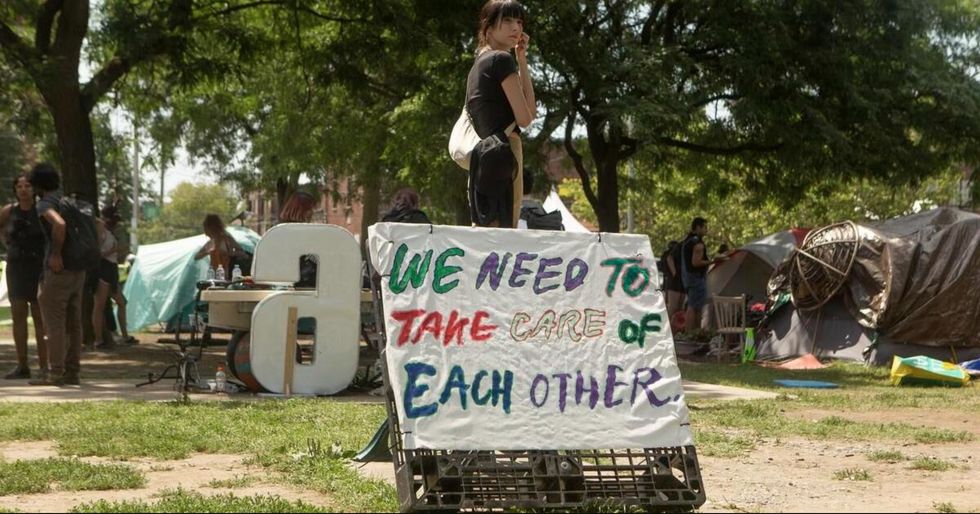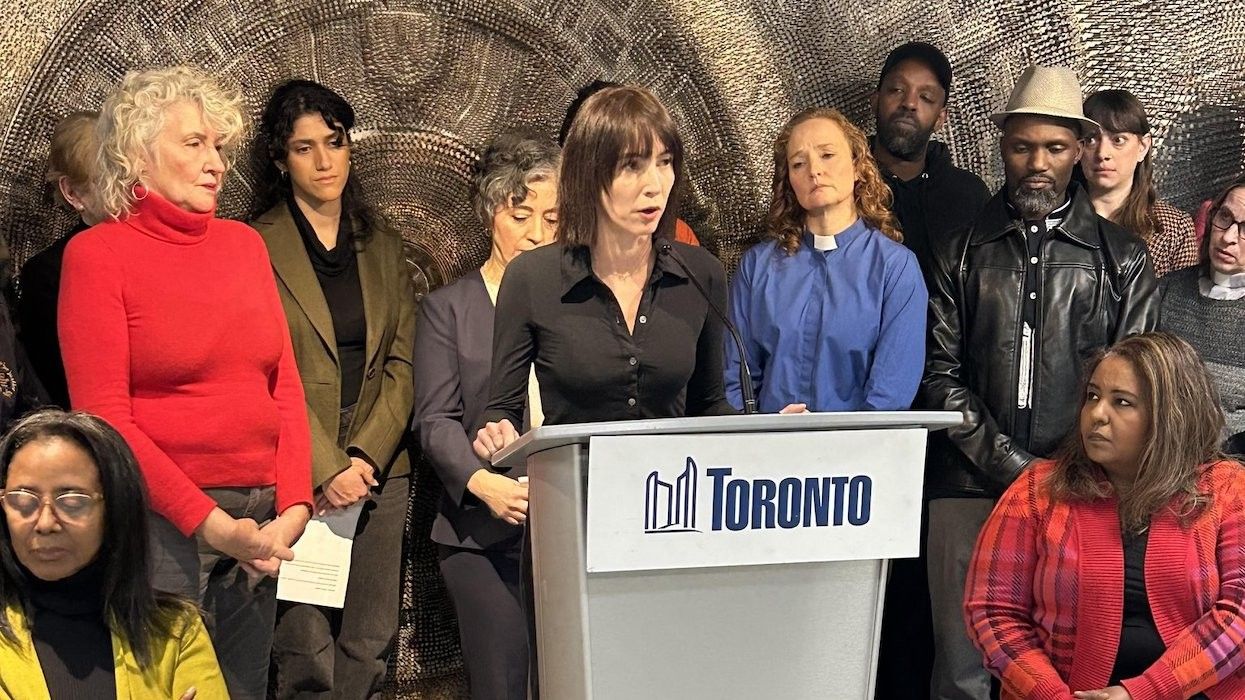In late-April, Diana Chan McNally found out she has been appointed as a public member to the City of Toronto's Housing Rights Advisory Committee. “She is a fierce advocate for the unhoused, and I think many of us appreciate the work she does to give voice to the people in our city who don’t have a voice,” said Ward 18-Willowdale City Councillor Lily Cheng before her fellow Council members at an April 23 meeting.
To Cheng’s point, Chan McNally has spent much of her career life advocating for the unhoused, and has had conversations with the the city's most marginalized that many of us will never have in our lifetimes.
Chan McNally has spent the past couple months as a fellow for Maytree, and before that, she was a Communications and Encampments Consultant with The Shift, where she put her weight behind a human rights-based approach for municipalities to deal with encampments. Dating back to 2016, Chan McNally has also worked in various harm reduction roles with organizations such as the All Saints Church-Community Centre, Toronto Drop-In Network, and West Neighbourhood House.
There’s a lot more we could say about Chan McNally's extensive experience, but we’re excited to give her a chance to speak to her own passions and advocacy. In an exclusive interview, STOREYS spoke with her about her recent appointment with the City, as well as her long-standing advocacy when it comes to homelessness and housing in Toronto.
STOREYS: Tell us about your background, and what your interests are in terms of advocacy?
Diana Chan McNally: My background actually is in art history, with some intersection with architecture – so very different from the on-the-ground work I'm doing now. The reason I got into this work was I was teaching at Centennial College, and a lot of my students probably should have had refugee status, but didn't. I ended up supporting them: finding work, finding programs that were more appropriate for them, finding English classes, finding housing. It ended up being work I really liked doing, so I left teaching almost entirely and started over again as a frontline worker, which I think a lot of people thought was strange and a step down, but it’s what I love doing.
With respect to your work surrounding encampments, are there any successes you can point to?
We saw some pretty egregious encampment evictions in 2021 in Toronto. The whole city was witness to a very militarized approach to encampments with police, pepper spray, and people physically assaulted. A lot of people were harmed during that process. Ultimately, we targeted 68 individuals and spent almost $3 million, and at the end of it, not a single person was housed. That became an opportunity to start to show the City a better way. I worked with folks who were currently unhoused, I also worked with some city councillors and came up with a set of policy recommendations, which the City never fully adopted. But what happened instead is that one councillor, who's no longer on Council, deployed it in her ward, and it became known as the Dufferin-Grove approach. And while she'll maintain credit for it, ultimately, the win was we were able to put the idea in her head that the better way to deal with encampments is to give people time, give them a choice, and give them actual resources and help them with things like ID and taxes, which are prerequisites to housing.
When we talk about advocacy, we can’t ever rest on our laurels and think we've ever really won. Across the board people's rights are now being scaled back. Things we've been winning or have won 40 years ago are now under fire again. So, when I talk about encampments and about wins, it’s always this trajectory forward. We're never really going to solve the issue entirely I don't think, especially in this province and in this country.
I’m sure there are many, but what are some battles you're still fighting, including with respect to Ford’s Bill 6?
Bill 6 is a battle I've been fighting now since the beginning of November, and it has had other iterations. Before, it was Bill 242. And what the bill does is essentially import an American-approach to encampments that has been championed by the likes of Donald Trump, which is now being deployed in various states and various municipalities, and which, in every instance, has shown not to work to address homelessness. What it does do is actually increase costs to the public in terms of policing and prisons. And the other part is what we've seen in the US, with less serious crime being solved as a result of police resources being spent on things like ticketing homeless people. So I'm trying to fight it because we actually have made-in-Canada approaches that will help solve the problem. I'm looking west and at Manitoba, where they're purchasing and renovating apartment buildings and putting people into them immediately. And we've seen that anyone who's been put into this housing in Manitoba, hasn't returned back outside. That's what success looks like, that's what eliminates encampments. And even in Ontario, in St. Thomas, they've significantly decreased homelessness, they've significantly decreased police calls around homeless people and public drug use because they've invested in supportive housing.
Looking to other Canadian regions, and even other global cities, can you point to other policy and systems in place that you think would work for us here?
Housing-first has been a concept from Samson Baris, and it has had bipartisan support in the US and has been deployed elsewhere, like Finland. And it's been proven for decades to work anywhere that it's employed. Milwaukee is another place where, very recently, they've started to use a housing-first approach, and they've seen significant decreases in homelessness — they're now down to just 17 individuals in the entire city of Milwaukee who are homeless. We're not even looking for novel approaches, we're looking at what has worked for decades.

What about at the municipal level? Is there anything that you can point to — any policy, any programs — that’ve been put into place that you find promising?
I think people have the right ideas a lot of the time, but I think our resources are not nearly what they should be in order to address the problem the way we would ideally like to. We have seen this Dufferin-Grove approach now become city protocol, but we only have enough resources to put it into one encampment at a time. And that actually isn't always successful. We've seen in Allen Gardens that there have been people who were offered shelter, but not housing, refused it, and then were evicted anyway. So, even within this better approach, we are still seeing encampment evictions happen without people necessarily getting what they need need, which ultimately is housing. It cannot be up to just the City alone to do that; we need to see all levels of government involved. I sympathize with the position the City is in — we can't actually enact a human-rights approach without the proper resources to do so — but I also question why they still would do things like evict people who are refusing what, to them, are unsafe services.
With respect to your appointment to the Human Rights Advisory Committee, tell us about how that came up and how you feel about it?
I'm surprised for a lot of different reasons. I had applied to be a member of the Committee in 2023 and didn't realize there had been people who had departed and that they were looking for new members. And so a motion was moved, I believe by Councillor Perks, who said, ‘We don't need a recruitment process, just put Diana on the committee.’ Honestly, to me, it's a huge step from where I used to be — I haven't always been very welcome inside of City Hall. I appreciate they understand that advocates can actually be helpful voices built into city processes.
Have you begun any work with the Committee yet?
I think our first meeting is on June 6, and I've been reviewing materials and have been in one working group meeting so far. The Committee itself only meets, I believe, three times a year.
Is there anything you hope to bring to the Committee or any specific issues that you want to get before Council?
I think what I can bring is a unique perspective, because I'm now working in the space of human rights advocacy. It is unusual to have that perspective brought into the City, including around homelessness, but in other ways as well. I find, from a frontline perspective, we see what bad policy looks like on the ground. We often don't get consulted when it comes to building new policies or revising them, so I'm hoping I can bring that particular angle as an advocate, as a frontline worker, as someone who, many years ago, was homeless themselves.
Looking at who's on the Committee and who's chairing it, is there anybody you're looking forward to working with?
Liz at Maytree, Annie Hodgins, who I've worked with through frontline work. I’m really looking forward to bringing together all of these people I know from different spaces, to work on something that is so important, which is to say city policy and implementing the right to housing.
You've probably had conversations with the unhoused that many of us haven't had and may never have. So tell us about what you’ve heard and what people are wanting and needing from the City right now?
Housing. Everybody wants housing. We know shelters aren't always very safe for people, and I hear a lot of the first-hand stories about what people are going through. I think if the public understood what it is like in these spaces, they would understand why people are actively saying, 'No, I will not go there'. We have a shelter where they haven't had running water in a week. They have 256 people there; that is a baseline health and hygiene issue that's slipped under the radar for an entire week and still is ongoing.
I also think there’s a lot of misunderstanding about what people are experiencing, and ultimately it’s trauma. It’s non-stop, 24/7 trauma. At a certain point, it just becomes part of their reality on a daily basis. We don't really have a trauma-informed approach when it comes to supporting homeless people, I think there's a lot of means-checking, I think there's a lot of barriers we create around things like substance use, and it's not appropriate, and it's not actually trauma informed. I have people whose normal is yelling, and that's how they create safety for themselves, by keeping others away. But that's seen as aggressive, as opposed to a mechanism to keep themselves safe. I just wish that there was a better on-the-ground understanding that we have a duty to accommodate people.
Questions and answers have been lightly edited for length and clarity.





















